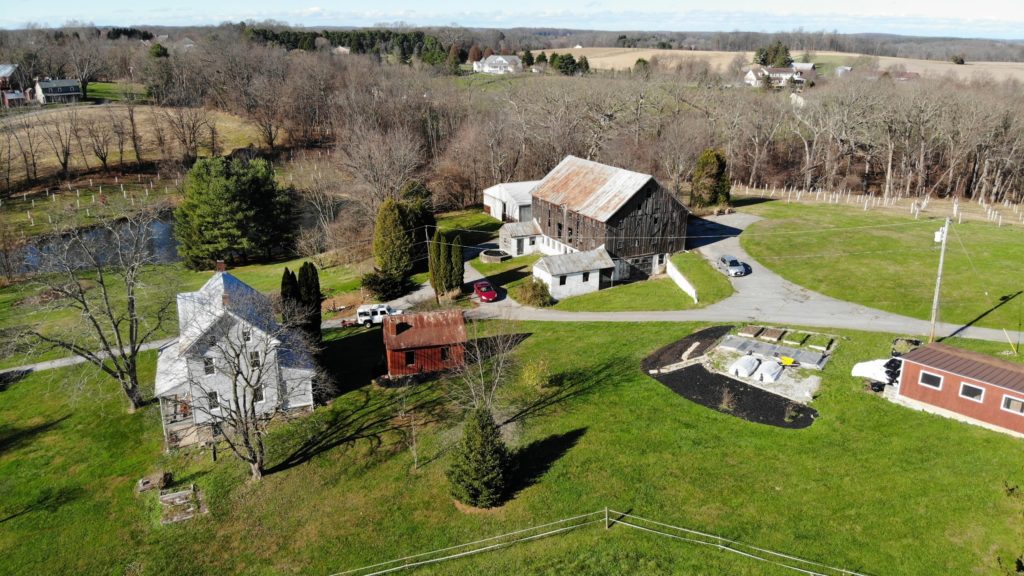Big Things Come From Small Farming

One of the joys of my work as a land broker is meeting and helping people. Some are planning for a retirement funded by selling of a farm, and some are new farmers looking for their place to start their dreams. Everyone has a unique story of how they got to where they are, and getting to know their stories makes me realize what a wonderful community these people make.
Below is a short interview with a newly married couple who I had the privilege of helping find their farm. As I learned about their story it made me realize how the world is brightened and changed one person, one couple, one family at a time. Enjoy hearing John and Julie’s story!
- What drove you to purchase the farm and for what purpose?
We started looking for farmland when we got engaged a little over a year ago. We knew that if we were going to get married and raise a family, we would want to raise our kids on a farm. We are also inspired by the Catholic Worker movement and wanted to have a space where we could invite people to live and work with us. Our purpose in buying land is to manage a space where those in material or spiritual poverty can come and enjoy the satisfying work of farming, and enjoy the fruits of their labor.
- What experiences have brought you to this place in life? Do you have some direct experience that is a catalyst for your new life on the farm?
I (Julie) started joking about becoming a farmer when I was in college—I use to say to myself, “I just want to be a farmer!” as if it would be a simpler life. I worked for a nonprofit in rural Panama and was so inspired by the deep connection that the indigenous communities had to the land and by their strong sense of community. One of my main objectives in working with the non-profit there was to identify and treat water quality issues. I noticed that the root problem of their poor water quality was coming from deforestation and unsustainable crop and pasture management upstream. This inspired me to get my MS in Agroecology at The Ohio State University to study more sustainable land management practices.
I (John) served as a Peace Corps volunteer in South Africa. My host mother had a small farm growing bananas, cassava, tomatoes, and maize in the Lomahasha valley. One thing I realized right away about farming is that it is very hard work, but I loved helping on the farm. This experience inspired me to study agricultural and development economics when I returned. I went to graduate school at Ohio State, where I met Julie through OSU Newman Center while she was finishing up her master’s degree.
After I (Julie) graduated, I took a in organic certification job reviewing inputs for organic farms at the Ohio Ecological Food and Farm Association (the midwestern version of CASA). It was an awesome organization to be a part of and I loved working with organic farmers, but after my second year there I just couldn’t sit at a desk for 40 hours a week. I had been in touch with the Dominican Sisters of Peace for the previous few years because of a shared interest in the intersection of faith and ecology. The farmer position opened up at Shepherd’s Corner, an ecology center outside of Columbus, so I took it and it was one of the best decisions I’ve ever made in my life. I thoroughly enjoyed working with volunteers, leading educational workshops, and of course, doing the hard work of farming.
John finished his PhD and took a position teaching economics at Loyola University Maryland. Once we were engaged, we started looking for a place in the Baltimore area where we could grow produce and share with others. By this time, it had become increasingly clear that “just being a farmer” is not really a simple life, but it is a satisfying one. We knew we wanted farming to be part of our life together.
- What would success look like for you with your new farm, and endeavors in 5 years?
In five years, we would love to have successfully established perennials, a good system for a vegetable plot rotation, and a financially viable marketing strategy that includes donating produce to those in need. We also have very little experience with livestock, so we’d love to find a niche that works for us, even if it’s only a few animals for our dairy or meat consumption. Perhaps more importantly, we’d call the farm a success in five years if we have created an effective culture for volunteers, interns, and our family to all work and learn together on the farm. A good test of this might be that we can leave for a week without things falling apart. While we are anticipating a lot of chaos and failures, we hope to develop an operation that is personally, ecologically, and financially sustainable in the long run.
John and Julie’s farm and their vision for their operation is shared by a growing number of small farmers around the United States. While big agriculture continues it’s growth curve, the 2019 USDA census reported a growth of organic farms from 14,000 to nearly 17,000 farms in the United States during the years 2016-2019.
The Chesapeake Bay Region due to it’s proximity to many urban centers and the tourism throughout are uniquely oriented for small farm operations. To learn more about this growing industry, the University of Maryland Extension Office is a good place to start University of Maryland Agricultural Extension
Thanks for reading and please contact John Campagna directly at John@thelandgroup.us about land tracts he is working on to suit a specialty farm operation.
